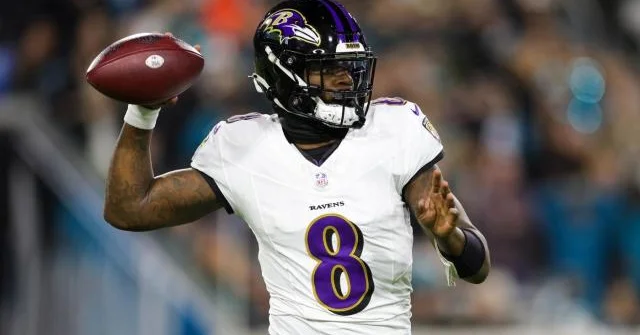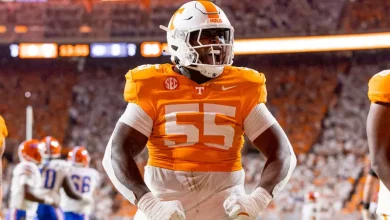Lamar Jackson Is Outside Top 5 in Pete Prisco’s Top 100 Players

Lamar Jackson, the dynamic quarterback of the Baltimore Ravens, has once again found himself at the center of heated debate and discussion regarding his standing among the NFL’s elite players. Recently, renowned NFL analyst Pete Prisco released his annual Top 100 Players list, a highly anticipated ranking that often sparks conversations around player value, performance, and league impact. While many expected Jackson to be near the very top, the latest rankings placed him outside the top five, raising eyebrows among fans, analysts, and even some players. This outcome has stirred a mixture of surprise, criticism, and thoughtful analysis as to why Jackson—arguably one of the most electrifying talents in the league—did not crack the upper echelon of Prisco’s list.
Lamar Jackson’s journey from being a relatively overlooked prospect to becoming an NFL MVP and a perennial Pro Bowler is a remarkable story of talent, perseverance, and innovation at the quarterback position. Since being drafted by the Ravens in the first round of the 2018 NFL Draft, Jackson has transformed the quarterback role with his unique blend of elite athleticism, rushing ability, and improving passing skills. His ability to extend plays, break defensive schemes, and impact games both through the air and on the ground has made him a true game-changer. Yet, despite these accomplishments and his undeniable impact, the fact that Pete Prisco placed Jackson outside the top five players sparks a broader conversation about how NFL talent is evaluated and ranked.
Prisco’s rankings, which are highly regarded in football circles, are based on a mixture of factors including individual performance, consistency, impact on team success, and perceived overall skill level. Each year, the rankings balance objective statistics with subjective analysis and expert opinion. While Jackson’s name is certainly included among the top players, his position just outside the top five suggests that Prisco and his team weighed other players’ contributions and value to their teams more heavily in this particular year. This decision invites an in-depth look into the possible reasons behind this ranking and what it signifies about Jackson’s current status in the NFL hierarchy.
One key aspect to consider is the evolution of Jackson’s game and how it stacks up against other elite players who were ranked higher. While Jackson’s rushing prowess remains unmatched at the quarterback position, critics often point to aspects of his passing game—such as deep ball accuracy, consistency under pressure, and decision-making in the pocket—as areas where he has room to grow. Despite steady improvements each season, some analysts argue that Jackson’s passing metrics do not yet consistently rival those of the league’s top traditional pocket passers like Patrick Mahomes, Josh Allen, or Joe Burrow. This perspective may have influenced Prisco’s evaluation, emphasizing a more balanced passing attack as essential for the highest player rankings.
Additionally, team performance and playoff success often weigh heavily in these rankings. The Ravens have experienced fluctuations in postseason outcomes during Jackson’s tenure, which might affect perceptions of his overall impact. While Jackson has led Baltimore to multiple playoff appearances and even an MVP award in 2019, the team’s inability to advance deep into the playoffs consistently may factor into critiques of his leadership or effectiveness in clutch moments. In the hyper-competitive NFL, playoff success is frequently seen as the ultimate measure of a player’s greatness, and this likely plays a role in how analysts like Prisco position players in their top 100 lists.
Another element influencing Jackson’s ranking is the sheer depth of talent in the NFL today. The league boasts a wealth of exceptional players across various positions, including dominant pass rushers like Aaron Donald and T.J. Watt, game-changing wide receivers like Justin Jefferson and Ja’Marr Chase, and versatile offensive weapons like Cooper Kupp. Many of these players have been recognized for their individual excellence, impact on games, and contributions to team victories, making the competition for a top-five spot incredibly fierce. The fact that Jackson remains just outside this group still underscores his elite status, even if it falls short of some fans’ expectations.
It is also worth examining the criteria and context of Pete Prisco’s rankings. Prisco’s evaluations are known for blending statistical analysis with his seasoned eye for talent and impact. His rankings often emphasize consistency, leadership, and ability to influence game outcomes beyond raw numbers. Players who consistently dominate games and inspire their teams tend to be rated highly. Given this, Jackson’s ranking outside the top five could reflect a nuanced critique balancing his spectacular individual plays with a more measured view of his overall contribution and consistency relative to other NFL stars.
Despite the rankings, Lamar Jackson’s unique style and skill set continue to redefine the quarterback position and challenge traditional evaluation metrics. His unparalleled rushing ability sets him apart in NFL history, and his growing proficiency as a passer has made him a dual-threat quarterback that defenses must prepare for in multiple ways. This versatility complicates straightforward comparisons with more conventional quarterbacks and invites broader discussions about how to measure player value in a changing league where mobility and playmaking versatility are increasingly prized.
Fans and analysts who support Jackson often point out that traditional statistics and rankings may not fully capture his intangible qualities such as leadership, charisma, and the ability to inspire teammates. His electrifying style of play energizes crowds and elevates the Ravens’ offense in ways that transcend standard metrics. Jackson’s ability to create plays out of broken situations and deliver highlight-reel moments contributes significantly to his value and the team’s success. These qualities, while harder to quantify, are essential to understanding his place among the NFL’s elite players.
Moreover, Jackson’s resilience and determination in overcoming skepticism throughout his career add to the respect he commands. Drafted with questions about his size, style, and passing ability, he has consistently proven doubters wrong by achieving remarkable milestones. His 2019 MVP season is a testament to his capability to perform at the highest level, and his continued growth indicates potential for even greater achievements in the future. For many observers, Jackson’s story is not just about where he ranks now but about the trajectory of his career and what he could accomplish in the years ahead.
The debate around Jackson’s placement in Pete Prisco’s top 100 is emblematic of a larger conversation about how the NFL evaluates talent in an era of rapidly evolving player roles and offensive schemes. As the league adapts to more dynamic styles of play, analysts must balance traditional measures of quarterback effectiveness—such as passing yards, touchdown-to-interception ratio, and completion percentage—with newer considerations like rushing production, ability to avoid sacks, and impact on team momentum. Jackson’s unique skill set challenges conventional evaluation frameworks and pushes analysts to reconsider what makes a player “elite.”
It’s also important to recognize that rankings are inherently subjective and reflect the opinions of the evaluator. While Pete Prisco is a respected voice in NFL analysis, different experts and fans may have vastly different rankings for Jackson. Some may place him firmly in the top five or even as the best player in the league, while others might view him as just outside that tier. This subjectivity highlights that no single list can definitively capture a player’s value or impact, and rankings should be viewed as starting points for discussion rather than final judgments.
Lamar Jackson’s response to these rankings has been characterized by a quiet confidence and focus on improving his game and leading his team. Known for his competitive spirit and dedication, Jackson has consistently worked on refining his passing mechanics and expanding his offensive arsenal. His leadership on the field remains unquestioned by teammates and coaches alike, and his ability to rally the Ravens during challenging moments is a hallmark of his play. This mindset bodes well for his continued development and potential to rise higher in future evaluations.
The broader context of the Ravens’ team dynamics also plays a role in how Jackson is perceived. The organization has invested heavily in surrounding him with talent, including adding weapons on offense and bolstering the defense. The recent signing of elite cornerback Jaire Alexander, for example, strengthens Baltimore’s defense and complements Jackson’s offensive prowess by potentially giving the offense better field position and more opportunities. These team-building efforts signal a commitment to supporting Jackson and creating a winning environment that could enhance his ability to climb the ranks in future player evaluations.
Looking ahead, Jackson’s trajectory remains promising. At just 27 years old, he is entering what many consider the prime years for an NFL quarterback. With continued improvements in his passing game, sustained health, and a strong supporting cast, Jackson has every opportunity to elevate his play to a level that could make him indisputably one of the very best players in the league. His unique combination of rushing and passing talent, leadership, and competitive drive makes him a formidable force capable of reshaping the NFL landscape.
Ultimately, while being placed outside the top five in Pete Prisco’s top 100 players list may feel like a slight to some fans, it is also a reflection of the competitive depth of talent in the NFL and the complexities involved in ranking players. Jackson remains one of the league’s most exciting and impactful players, and his influence extends far beyond any single ranking. His style of play continues to inspire a new generation of quarterbacks and fans, and his ongoing development promises to keep him in the conversation among the NFL’s elite for years to come.
Lamar Jackson’s positioning outside the top five in Pete Prisco’s latest top 100 players list is a compelling talking point that invites deeper reflection on how player value is assessed in the NFL today. While Jackson may not have cracked the highest tier according to Prisco’s analysis, his unique talents, leadership, and continued growth affirm his place among the league’s very best. The debate surrounding his ranking underscores the evolving nature of football evaluation and highlights Jackson’s role as a transformative figure in the sport. As he continues to develop and lead the Ravens, there is little doubt that Jackson will remain a central figure in NFL discussions, captivating fans and analysts alike with his electrifying style and undeniable impact on the game.









